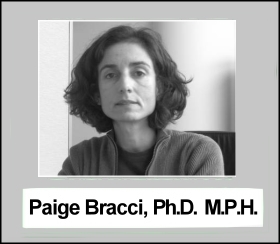
Paige M. Bracci, Ph.D., M.P.H.
___________
Assistant Professor, Division of Cancer Epidemiology
Department of Epidemiology and Biostatistics
School of Medicine
University of California San Francisco
"It is a pleasure and honor to have been selected as this year’s recipient of the Young Scientist Award given by the Lymphoma Foundation of America. I greatly appreciate the Foundation’s recognition of my work in non-Hodgkin lymphoma epidemiology. I hope to honor this distinction in my future research endeavors by continuing to work toward identifying risk factors and exposures that can be applied to prevent disease and to improve the prognosis of lymphoma patients.
“I have had the privilege of working with Dr. Elizabeth Holly on her population-based studies of non-Hodgkin lymphoma for more than a decade. Under her mentorship, I pursued and completed my doctoral work investigating whether use of statin medications and genetic variance in statin-related biologic pathways alter risk of non-Hodgkin lymphoma. Statins have significant biologic effects beyond their cholesterol-lowering effects including downstream immunomodulatory and anti-inflammatory influences, some that have been associated with antitumor/anticancer activity. The in-depth work required for my dissertation stimulated my interest in the role of immunologic and inflammatory factors in lymphomagenesis. More recently I have further refined this interest to focus on modifiable factors e.g. obesity, physical activity, diet, and sleep, factors that a growing number of scientific studies have shown to impact immune function and inflammatory processes. As personally modifiable factors, clarifying their role in NHL development and survivorship holds promise for broad-reaching recommendations and interventions that promote cancer prevention and improve prognosis of survivors.
“As a junior faculty member at UCSF, I am fortunate to be in an environment that encourages trans-disciplinary collaborative research projects and allows me to pursue studies that are innovative, complement my research interests and foster a comprehensive approach to NHL research. In addition, as an active member of InterLymph, an international consortium of researchers who have or are conducting population-based studies of lymphoma, I have had the opportunity to contribute to projects that enable the study of rare exposures and rare NHL subtypes that no single study can adequately investigate.
“I have great hope that with the support, encouragement and promotion of young investigators such as through the Lymphoma Foundation of America, we will continue to conduct research that advances our understanding of lymphoma and produces results that can be translated to patients and their families."
|


